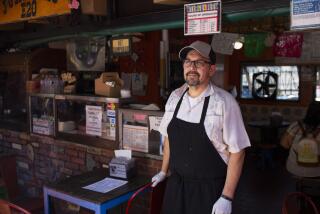Small Business in Third World
- Share via
Your article (March 24), “Africa’s Tiny Shops Thrive Amid Poverty,” was a welcome signal that micro-enterprise (small business of one-to-five people) in developing nations is not only a good idea, it also exists and is growing rapidly.
Congress is presently considering a piece of legislation, HR 910, the Self-Sufficiency for the Poor Act of 1987, which would facilitate loans to just such people as those represented in your article--the very poorest segment of the world’s population.
The Grameen Bank in Bangladesh has done this very thing for more than 250,000 people. FINCA/Save The Children is doing this in Latin America, having already reached 32,000, as has the BKK in Indonesia for 200,000 people. Loans averaging $60 are being paid back on schedule at a rate of 98% by the very poorest people in the world. Their reliability has been proven and the road to self-sufficiency begun.
The article was quite accurate when it said, “The spirit of enterprise permeates even the most lifeless economies in Africa.” In many areas of the Third World this “informal sector” entrepreneurship comprises up to 80% of a local economy. The potential effect of this kind of help is enormous and would cost the U.S. taxpayer nothing.
But our foreign aid administrators must get a stronger message from us, their electors, that these models need expanding through a shift in foreign aid policy. HR 910 turns grants for less inspiring projects into highly effective loans empowering the very poorest people to end their cycle of poverty and dependency. This bill carries the vision of a world without hunger and could replace the sometimes wasteful, trickle-down theory of present programs.
RICHARD HILTON
North Hollywood
More to Read
Inside the business of entertainment
The Wide Shot brings you news, analysis and insights on everything from streaming wars to production — and what it all means for the future.
You may occasionally receive promotional content from the Los Angeles Times.










